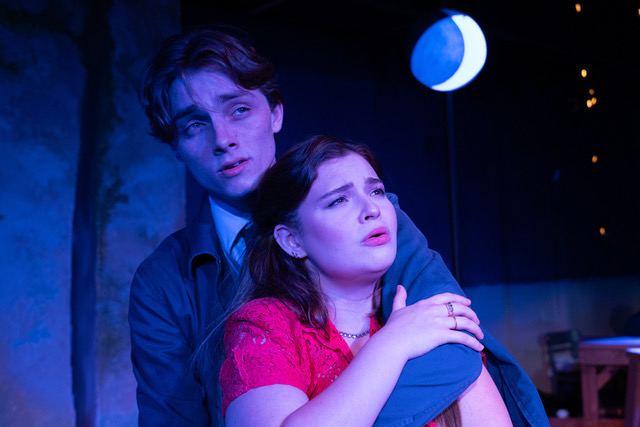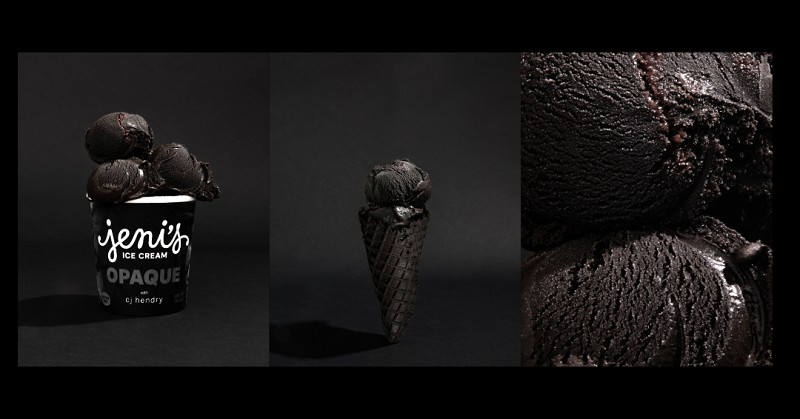
The original production of The Fantasticks premiered on May 3, 1960, at the Sullivan Street Playhouse in New York’s Greenwich Village. The play ran for forty-two years, logging 17,162 performances, becoming the longest-running off-Broadway musical in American history. It would seem that Tom Jones’ book and lyrics with Harvey L. Schmidt’s music were intended to illuminate universal themes of the human condition, including love and raising children through young adulthood, who leave home and experience the harshness of the world. Not having seen the original production, I don’t have a frame of reference but can only report on what was on the Ruskin stage the night I saw the revival of this American classic.
The play, under the direction of theatre veteran Elina de Santos, is basically a love story with a better ending than Romeo and Juliet. It begins with the entrance of Mute (Raven Scott), who acknowledges the audience and invites the other characters to introduce themselves. They scurry across the stage, settling on a platform where a curtain with the word “The Fantasticks” hangs in front. On stage left is a large wooden box containing theatrical props, which also serves as a comical set piece for the actors to make their entrances and exits. The rest of the cast listens as El Gallo (Danny Bernardo El Gallo and Narrator) sings one of the most famous songs from the original production –Try To Remember.
Much like the theatrical device used in Our Town or The Skin of Our Teeth, he breaks the fourth wall and sings and speaks directly to the audience, narrating the action as it unfolds. When not reduced to histrionics, Bernardo delivers some believable, organic moments. There are 14 songs interspersed throughout the two-act play, including Soon It’s Gonna Rain sung by Luisa and Matt. So, here’s the storyline: Matt “Boy” is played by Rhett Hemingway (more suited to cinema than stage), and Luisa, “Girl,” wonderfully played by Sophie Pollono, are teenage neighbors who have known each other since they were children and are just good friends. Their fathers, who appear to be enemies but really aren’t, actually want the kids to marry and plot to keep Matt and Luisa apart so they can’t visit with each other, and toward that end, build an imaginary wall. Lots of climbing up and down on a step stool to signify that wall. Implied scenery is a well-known theatrical device and is replicated throughout the play using “sense memory,” where the actor indicates something like watering an invisible garden. Anyway, the conniving parents assume that by keeping the youngsters apart, their love will grow and they will eventually marry, which is their intended goal.
They hire a couple of thugs to set up an attempted abduction of the 16-year-old innocent Luisa creating an opportunity for Matt to become a hero to impress Luisa, which he does through winning a fencing duel There’s an abundance of childish silliness throughout this two-act play as Luisa goes on a journey encountering an assortment of unsavory characters until at last this all comes to an end and as the Bard wrote, “All’s Well That Ends Well.” (not exactly). What de Santos delivered was a conglomeration of acting styles ranging from realism, naturalism, absurdity (commedia dell’arte) to surrealism and classical.
The exception is Pollono, who didn’t fall prey to mannered acting but delivered a measured, realistic performance through her grounded characterization and beautiful soprano legit voice. Her steady, thoughtful performance only served to highlight the deficiencies of most of the rest of the cast and just how over-the-top most of the actors were, their performances not rising above high-school level. The only other exception was Scott as Mute, who delivered a non-verbal, believable performance. Her role was keeper of the props, including rain dust and star dust, which she sprinkled on the characters to signify, well, yes, rain or star dust.
Other cast members included Michael D. Cohen as Bellomy, Kiel Kennedy as Hucklebee, Michael Redfield as Mortimer, and John Wuchte as Henry, all of whom performed as directed. Now, don’t get me wrong. I love flights of fancy, a variety of theatrical styles, and bizarre plot twists as long as they are truthfully executed. Historically, there have been successful over-the-top performances in French farces such as Molière’s The School for Wives, The Doctor in Spite of Himself, or The Imaginary Invalid. Unfortunately, this was not the case in this production and the blame must lay squarely at the feet of de Santos, who, in my opinion, let her professional cast down by not guiding them into giving believable, fully actuated performances. They represented raw material there for the shaping, but alas, that did not happen.
The Ruskin Group Theatre is waiting for final approval on their new performance space, which I’m sure will be used to present a theatre more worthy of this successful theatre’s reputation and, I might add, one of my favorite venues.
THE FANTASTICKS
Ruskin Group Theatre
3000 Airport Avenue
Santa Monica, CA 90405













